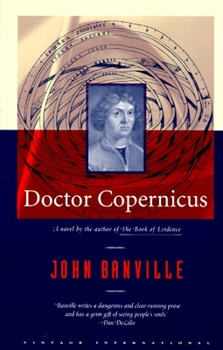Book Overview
From the Booker Prize-winning author of The Sea comes a novel set in sixteenth-century Europe about an obscure cleric who is preparing a theory that will shatter the medieval view of the universe--while being haunted by his malevolent brother and threatened by the conspiracies raging around him and his ideas.
Sixteenth-century Europe is teeming with change and controversy: wars are being waged by princes and bishops and the...
Format:Paperback
Language:English
ISBN:0679737995
ISBN13:9780679737995
Release Date:October 1993
Publisher:Vintage
Length:256 Pages
Weight:0.49 lbs.
Dimensions:0.6" x 5.2" x 8.0"
Related Subjects
Contemporary Fiction Genre Fiction Historical Literary Literature & Fiction World LiteratureCustomer Reviews
2 ratings
Scientific, religious, and political revolution
Published by Thriftbooks.com User , 17 years ago
This is the third Banville novel I have read and I find his writing exceptional and challenging. I first read The Sea and then Kepler. Doctor Copernicus, while less poetic than The Sea, is my favorite of the three. I think it is significant that Banville in his Acknowledgments mentions Thomas S. Kuhn's The Copernican Revolution as a major source. This becomes evident in the second half of the book where Banville does an exceptional job of integrating into novel form Thomas Kuhn's Structure of Scientific Revolution into the narrative structure of the novel. Yet, like the works of Iris Murdoch, the philosophy and science are woven seemlessly into the novel structure, never overpowering. John Banville will win the Nobel Prize for literature one day - mark my word. There are several strenghts in this novel that I would point out. First, Banville captured a medieval world of turmoil, disease, filth, ignorance, and death. Yet he also captures how exceptional intelligence may be embedded in this world, rise above squalor, develop an intellectual social network for passage of ideas, and produce a product that will communicate to the future ages. And yet, Banville's genius is also to negate these concepts by revealing that exceptional intelligence is still unable to grasp the thing in itself, the nature of reality. That human squalor is a reality in all times and that Copernicus distances himself from the human condition at a price. Copernicus is also a medical physician who is powerless against the horror of syphilis. Banville also allows us no illusion that science is a process of progress marching toward truth, but he has his character Copernicus recognize that his hypotheses in fact would soon be replaced by new truth systems and these new truth systems were only a micron closer to any final reality. Thus we are presented with a picture of human genius which is shown to be limited by the short life span of humans, our inability to focus and concentrate, the wild distractions of everyday life and the pain of the human condition. The life of Copernicus takes place during a theological revolution with political ramifications. Copernicus lives in Ermland, a Germanic state ruled primarily by his uncle, the Bishop Lucas. This tiny state falls between the Prussian and Germanic Lutheran forces and those of the Teutonic Knights and the Polish Catholic king. Thus Banville has his Copernicus experience the terrors of a theological revolution, as expressed when Copernicus must list the names of the over 2000 victims of the struggle between the Germanic states and Poland for the tiny Baltic states that lay between them. Whereas Copernicus, a Canon of the Catholic Church, no longer believes in the Medieval construction of God, neither Catholic nor Lutheran, he does cling to the rituals of Catholicism and believes that some human truth resides in these ritualistic acts that are independent of the current theology but may be linked to an ultimate reality beyon
Could Life Really Have Been So Difficult?
Published by Thriftbooks.com User , 21 years ago
Perhaps, the most salient quality of Mr. Baneville's novel is the medieval context in which it placed. This is a world where syphilis is a terminal and disfiguring disease, where bandits and brigands roam the countryside raping and looting at will. It is a world still lost in the dark caves of superstition and ignorance humanity retreats into when the lights of science and reason have been lost. Baneville's focus and adroit recreation of the perilous setting of late medieval Europe highlights the ultimate importance of Copernicus's astronomical theories and why they were so much more than some abstract academic exercise.





